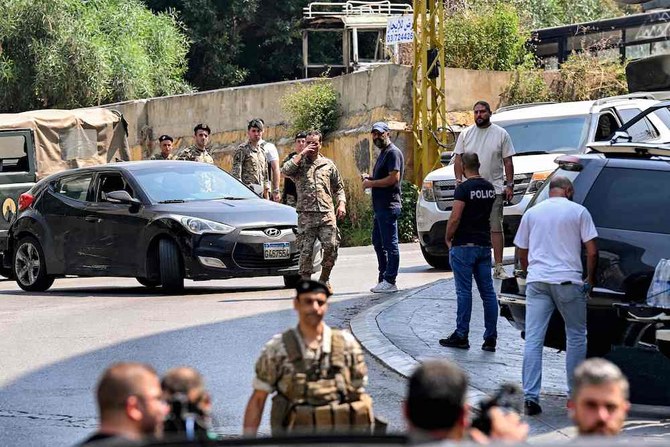BEIRUT: A Syrian man fired shots at the US embassy in Lebanon on Wednesday and was subsequently wounded in an exchange of fire, according to the Lebanese army.
Arab News learned from a security source that the attacker, Qais Al-Faraj, lives in Majdal Anjar, a Lebanese town bordering Syria.
He took a bus to the embassy in the Awkar area on Wednesday morning and told security services that he carried out the attack “in support of the people of Gaza.”
A judicial source told Arab News: “The attacker’s brother is being pursued by the military court on terrorism-related charges and had previously been released.”
The source added the attacker was receiving religious lessons from a Syrian cleric who turned himself in after the incident, and expressed concern that “the gunman might have been prepared to carry out terrorist attacks under the guise of supporting the people of Gaza.”
The Lebanese army said: “The US embassy in the Awkar area was fired upon by a Syrian national. Army personnel in the area responded to the source of the fire, resulting in the shooter being wounded and subsequently arrested and transferred to a hospital for treatment. Investigations are ongoing to determine the circumstances of the incident.”
Lisa Johnson, the US ambassador, is currently traveling outside Lebanon.
Army units deployed around the embassy conducted a search operation. It was reported by some media that there were three attackers, while other outlets said there were four.
Surveillance cameras recorded a single individual firing shots for around 10 minutes shortly before 9 a.m. and hiding among parked cars around the embassy. Residents in the area were seen calling security services for help, reporting “a person firing in all directions.”
Footage shared on social media showed the gunman, who was wearing a vest inscribed with “Daesh” in Arabic, lying on the ground bleeding profusely.
It was later revealed that he is registered with the UN High Commissioner for Refugees as a Syrian refugee who lives with his family members in Majdal Anjar.
The US embassy lies north of Beirut in a highly secure zone. It relocated out of the capital following a suicide attack in 1983 which killed more than 60 people.
Several raids were conducted on multiple houses in Majdal Anjar and five people, including the attacker’s brother, apprehended. The attacker’s father was questioned and his statement was recorded.
The Syrian cleric, Malek Al-Hajja, was arrested outside the Abu Bakr Al-Siddiq Mosque. He voluntarily surrendered to an intelligence patrol at the Azhar Al-Bekaa headquarters.
Wanted people have often been arrested in Majdal Anjar accused of belonging to Daesh. A Lebanese security source said: “The number of detainees rose to more than 10 people including Lebanese, Syrians and Palestinians. Additionally, a significant quantity of weapons, ammunition and other items were confiscated.”
The embassy said: “At 8:34 a.m. local time, small arms fire was reported in the vicinity of the entrance to the US embassy ... Our facility and our team are safe. Investigations are underway and we are in close contact with (the) host country’s law enforcement."
Lebanon Premier Najib Mikati followed developments with his defense minister, army chief, and other security chiefs.
Foreign Minister Abdullah Bou Habib condemned the attack, affirming “Lebanon’s commitment to protecting the diplomatic missions operating in Beirut in accordance with its obligations and the Vienna Convention.”
The Free Patriotic Movement said it “absolutely rejects Lebanon being a testing ground or a message box for any party, whether inside or outside.”
The US embassy compound was previously targeted in September last year.
Investigations later revealed that the perpetrator was working as a delivery person who fired at embassy guards due to his dissatisfaction with their treatment of him. There were no political motives behind the attack.





























